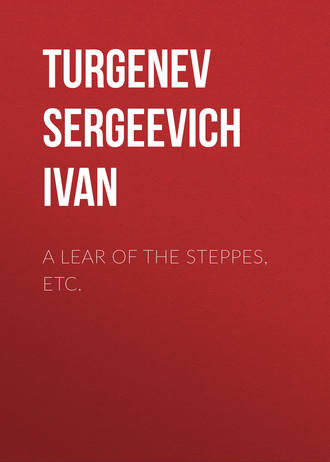
Иван Тургенев
A Lear of the Steppes, etc.
FOURTH LETTER
From the SAME to the SAME
M – Village, June 20, 1850.
The reading took place yesterday, dear friend, and here follows the manner thereof. First of all, I hasten to tell you: a success quite beyond all expectation – success, in fact, is not the word… Well, I’ll tell you. I arrived to dinner. We sat down a party of six to dinner: she, Priemkov, their little girl, the governess (an uninteresting colourless figure), I, and an old German in a short cinnamon-coloured frock-coat, very clean, well-shaved and brushed; he had the meekest, most honest face, and a toothless smile, and smelled of coffee mixed with chicory … all old Germans have that peculiar odour about them. I was introduced to him; he was one Schimmel, a German tutor, living with the princes H., neighbours of the Priemkovs. Vera Nikolaevna, it appeared, had a liking for him, and had invited him to be present at the reading. We dined late, and sat a long while at table, and afterwards went a walk. The weather was exquisite. In the morning there had been rain and a blustering wind, but towards evening all was calm again. We came out on to an open meadow. Directly over the meadow a great rosy cloud poised lightly, high up in the sky; streaks of grey stretched like smoke over it; on its very edge, continually peeping out and vanishing again, quivered a little star, while a little further off the crescent of the moon shone white upon a background of azure, faintly flushed with red. I drew Vera Nikolaevna’s attention to the cloud.
‘Yes,’ she said, ‘that is lovely; but look in this direction.’ I looked round. An immense dark-blue storm-cloud rose up, hiding the setting sun; it reared a crest like a thick sheaf flung upwards against the sky; it was surrounded by a bright rim of menacing purple, which in one place, in the very middle, broke right through its mighty mass, like fire from a burning crater…
‘There’ll be a storm,’ remarked Priemkov.
But I am wandering from the main point.
I forgot to tell you in my last letter that when I got home from the Priemkovs’ I felt sorry I had mentioned Faust; Schiller would have been a great deal better for the first time, if it was to be something German. I felt especially afraid of the first scenes, before the meeting with Gretchen. I was not quite easy about Mephistopheles either. But I was under the spell of Faust, and there was nothing else I could have read with zest. It was quite dark when we went into the summer-house; it had been made ready for us the day before. Just opposite the door, before a little sofa, stood a round table covered with a cloth; easy-chairs and seats were placed round it; there was a lamp alight on the table. I sat down on the little sofa, and took out the book. Vera Nikolaevna settled herself in an easy-chair, a little way off, close to the door. In the darkness, through the door, a green branch of acacia stood out in the lamplight, swaying lightly; from time to time a flood of night air flowed into the room. Priemkov sat near me at the table, the German beside him. The governess had remained in the house with Natasha. I made a brief, introductory speech. I touched on the old legend of doctor Faust, the significance of Mephistopheles, and Goethe himself, and asked them to stop me if anything struck them as obscure. Then I cleared my throat… Priemkov asked me if I wouldn’t have some sugar water, and one could perceive that he was very well satisfied with himself for having put this question to me. I refused. Profound silence reigned. I began to read, without raising my eyes. I felt ill at ease; my heart beat, and my voice shook. The first exclamation of sympathy came from the German, and he was the only one to break the silence all the while I was reading… ‘Wonderful! sublime!’ he repeated, adding now and then, ‘Ah! that’s profound.’ Priemkov, as far as I could observe, was bored; he did not know German very well, and had himself admitted he did not care for poetry!.. Well, it was his own doing! I had wanted to hint at dinner that his company could be dispensed with at the reading, but I felt a delicacy about saying so. Vera Nikolaevna did not stir; twice I stole a glance at her. Her eyes were fixed directly and intently upon me; her face struck me as pale. After the first meeting of Faust with Gretchen she bent forward in her low chair, clasped her hands, and remained motionless in that position till the end. I felt that Priemkov was thoroughly sick of it, and at first that depressed me, but gradually I forgot him, warmed up, and read with fire, with enthusiasm… I was reading for Vera Nikolaevna alone; an inner voice told me that Faust was affecting her. When I finished (the intermezzo I omitted: that bit belongs in style to the second part, and I skipped part, too, of the ‘Night on the Brocken’) … when I finished, when that last ‘Heinrich!’ was heard, the German with much feeling commented – ‘My God! how splendid!’ Priemkov, apparently overjoyed (poor chap!), leaped up, gave a sigh, and began thanking me for the treat I had given them… But I made him no reply; I looked towards Vera Nikolaevna … I wanted to hear what she would say. She got up, walked irresolutely towards the door, stood a moment in the doorway, and softly went out into the garden. I rushed after her. She was already some paces off; her dress was just visible, a white patch in the thick shadow.
‘Well?’ I called – ‘didn’t you like it?’
She stopped.
‘Can you leave me that book?’ I heard her voice saying.
‘I will present it you, Vera Nikolaevna, if you care to have it.’
‘Thank you!’ she answered, and disappeared.
Priemkov and the German came up to me.
‘How wonderfully warm it is!’ observed Priemkov; ‘it’s positively stifling. But where has my wife gone?’
‘Home, I think,’ I answered.
‘I suppose it will soon be time for supper,’ he rejoined. ‘You read splendidly,’ he added, after a short pause.
‘Vera Nikolaevna liked Faust, I think,’ said I.
‘No doubt of it!’ cried Priemkov.
‘Oh, of course!’ chimed in Schimmel.
We went into the house.
‘Where’s your mistress?’ Priemkov inquired of a maid who happened to meet us.
‘She has gone to her bedroom.’
Priemkov went off to her bedroom.
I went out on to the terrace with Schimmel. The old man raised his eyes towards the sky.
‘How many stars!’ he said slowly, taking a pinch of snuff; ‘and all are worlds,’ he added, and he took another pinch.
I did not feel it necessary to answer him, and simply gazed upwards in silence. A secret uncertainty weighed upon my heart… The stars, I fancied, looked down seriously at us. Five minutes later Priemkov appeared and called us into the dining-room. Vera Nikolaevna came in soon after. We sat down.
‘Look at Verotchka,’ Priemkov said to me.
I glanced at her.
‘Well? don’t you notice anything?’
I certainly did notice a change in her face, but I answered, I don’t know why —
‘No, nothing.’
‘Her eyes are red,’ Priemkov went on.
I was silent.
‘Only fancy! I went upstairs to her and found her crying. It’s a long while since such a thing has happened to her. I can tell you the last time she cried; it was when our Sasha died. You see what you have done with your Faust!’ he added, with a smile.
‘So you see now, Vera Nikolaevna,’ I began, ‘that I was right when – ’
‘I did not expect this,’ she interrupted me; ‘but God knows whether you are right. Perhaps that was the very reason my mother forbade my reading such books, – she knew – ’
Vera Nikolaevna stopped.
‘What did she know?’ I asked. ‘Tell me.’
‘What for? I’m ashamed of myself, as it is; what did I cry for? But we’ll talk about it another time. There was a great deal I did not quite understand.’
‘Why didn’t you stop me?’
‘I understood all the words, and the meaning of them, but – ’
She did not finish her sentence, and looked away dreamily. At that instant there came from the garden the sound of rustling leaves, suddenly fluttering in the rising wind. Vera Nikolaevna started and looked round towards the open window.
‘I told you there would be a storm!’ cried Priemkov. ‘But what made you start like that, Verotchka?’
She glanced at him without speaking. A faint, far-off flash of lightning threw a mysterious light on her motionless face.
‘It’s all due to your Faust,’ Priemkov went on. ‘After supper we must all go to by-by… Mustn’t we, Herr Schimmel?’
‘After intellectual enjoyment physical repose is as grateful as it is beneficial,’ responded the kind-hearted German, and he drank a wine-glass of vodka.
Immediately after supper we separated. As I said good-night to Vera Nikolaevna I pressed her hand; her hand was cold. I went up to the room assigned to me, and stood a long while at the window before I undressed and got into bed. Priemkov’s prediction was fulfilled; the storm came close, and broke. I listened to the roar of the wind, the patter and splash of the rain, and watched how the church, built close by, above the lake, at each flash of lightning stood out, at one moment black against a background of white, at the next white against a background of black, and then was swallowed up in the darkness again… But my thoughts were far away. I kept thinking of Vera Nikolaevna, of what she would say to me when she had read Faust herself, I thought of her tears, remembered how she had listened…
The storm had long passed away, the stars came out, all was hushed around. Some bird I did not know sang different notes, several times in succession repeating the same phrase. Its clear, solitary voice rang out strangely in the deep stillness; and still I did not go to bed…
Next morning, earlier than all the rest, I was down in the drawing-room. I stood before the portrait of Madame Eltsov. ‘Aha,’ I thought, with a secret feeling of ironical triumph, ‘after all, I have read your daughter a forbidden book!’ All at once I fancied – you have most likely noticed that eyes en face always seem fixed straight on any one looking at a picture – but this time I positively fancied the old lady moved them with a reproachful look on me.
I turned round, went to the window, and caught sight of Vera Nikolaevna. With a parasol on her shoulder and a light white kerchief on her head, she was walking about the garden. I went out at once and said good-morning to her.
‘I didn’t sleep all night,’ she said; ‘my head aches; I came out into the air – it may go off.’
‘Can that be the result of yesterday’s reading?’ I asked.
‘Of course; I am not used to it. There are things in your book I can’t get out of my mind; I feel as though they were simply turning my head,’ she added, putting her hand to her forehead.
‘That’s splendid,’ I commented; ‘but I tell you what I don’t like – I’m afraid this sleeplessness and headache may turn you against reading such things.’
‘You think so?’ she responded, and she picked a sprig of wild jasmine as she passed. ‘God knows! I fancy if one has once entered on that path, there is no turning back.’
She suddenly flung away the spray.
‘Come, let us sit down in this arbour,’ she went on; ‘and please, until I talk of it of my own accord, don’t remind me – of that book.’ (She seemed afraid to utter the name Faust.)
We went into the arbour and sat down.
‘I won’t talk to you about Faust,’ I began; ‘but you will let me congratulate you and tell you that I envy you.’
‘You envy me?’
‘Yes; you, as I know you now, with your soul, have such delights awaiting you! There are great poets besides Goethe; Shakespeare, Schiller – and, indeed, our own Pushkin, and you must get to know him too.’
She did not speak, and drew in the sand with her parasol.
O, my friend, Semyon Nikolaitch! if you could have seen how sweet she was at that instant; pale almost to transparency, stooping forward a little, weary, inwardly perturbed – and yet serene as the sky! I talked, talked a long while, then ceased, and sat in silence watching her… She did not raise her eyes, and went on drawing with her parasol and rubbing it out again. Suddenly we heard quick, childish steps; Natasha ran into the arbour. Vera Nikolaevna drew herself up, rose, and to my surprise she embraced her daughter with a sort of passionate tenderness… That was not one of her ways. Then Priemkov made his appearance. Schimmel, that grey-haired but punctual innocent, had left before daybreak so as not to miss a lesson. We went in to morning tea.
But I am tired; it’s high time to finish this letter. It’s sure to strike you as foolish and confused. I feel confused myself. I’m not myself. I don’t know what’s the matter with me. I am continually haunted by a little room with bare walls, a lamp, an open door, the fragrance and freshness of the night, and there, near the door, an intent youthful face, light white garments… I understand now why I wanted to marry her: I was not so stupid, it seems, before my stay in Berlin as I had hitherto supposed. Yes, Semyon Nikolaitch, your friend is in a curious frame of mind. All this I know will pass off … and if it doesn’t pass off, – well, what then? it won’t pass off, and that’s all. But any way I am well satisfied with myself; in the first place, I have spent an exquisite evening; and secondly, if I have awakened that soul, who can blame me? Old Madame Eltsov is nailed up on the wall, and must hold her peace. The old thing!.. I don’t know all the details of her life; but I know she ran away from her father’s house; she was not half Italian for nothing, it seems. She wanted to keep her daughter secure … we shall see.
I must put down my pen. You, jeering person, pray think what you like of me, only don’t jeer at me in writing. You and I are old friends, and ought to spare each other. Good-bye! – Yours, P. B.
FIFTH LETTER
From the SAME to the SAME
M – Village, July 26, 1850.
It’s a long time since I wrote to you, dear Semyon Nicolaitch; more than a month, I think. I had enough to write about but I was overcome by laziness. To tell the truth, I have hardly thought of you all this time. But from your last letter to me I gather that you are drawing conclusions in regard to me, which are unjust, that is to say, not altogether just. You imagine I have fallen in love with Vera (I feel it awkward, somehow, to call her Vera Nikolaevna); you are wrong. Of course I see her often, I like her extremely … indeed, who wouldn’t like her? I should like to see you in my place. She’s an exquisite creature! Rapid intuition, together with the inexperience of a child, clear common-sense, and an innate feeling for beauty, a continual striving towards the true and the lofty, and a comprehension of everything, even of the vicious, even of the ridiculous, a soft womanly charm brooding over all this like an angel’s white wings… But what’s the use of words! We have read a great deal, we have talked a great deal together during this month. Reading with her is a delight such as I had never experienced before. You seem to be discovering new worlds. She never goes into ecstasies over anything; anything boisterous is distasteful to her; she is softly radiant all over when she likes anything, and her face wears such a noble and good – yes, good expression. From her earliest childhood Vera has not known what deceit was; she is accustomed to truth, it is the breath of her being, and so in poetry too, only what is true strikes her as natural; at once, without effort or difficulty, she recognises it as a familiar face … a great privilege and happiness. One must give her mother credit for it. How many times have I thought, as I watched Vera – yes, Goethe was right, ‘the good even in their obscure striving feel always where the true path lies.’ There is only one thing annoying – her husband is always about the place. (Please don’t laugh a senseless guffaw, don’t sully our pure friendship, even in thought). He is about as capable of understanding poetry as I am of playing the flute, but he does not like to lag behind his wife, he wants to improve himself too. Sometimes she puts me out of patience herself; all of a sudden a mood comes over her; she won’t read or talk, she works at her embroidery frame, busies herself with Natasha, or with the housekeeper, runs off all at once into the kitchen, or simply sits with her hands folded looking out of the window, or sets to playing ‘fools’ with the nurse… I have noticed at these times it doesn’t do to bother her; it’s better to bide one’s time till she comes up, begins to talk or takes up a book. She has a great deal of independence, and I am very glad of it. In the days of our youth, do you remember, young girls would sometimes repeat one’s own words to one, as they so well knew how, and one would be in ecstasies over the echo, and possibly quite impressed by it, till one realised what it meant? but this woman’s … not so; she thinks for herself. She takes nothing on trust; there’s no overawing her with authority; she won’t begin arguing; but she won’t give in either. We have discussed Faust more than once; but, strange to say, Gretchen she never speaks of, herself, she only listens to what I say of her. Mephistopheles terrifies her, not as the devil, but as ‘something which may exist in every man…’ These are her own words. I began trying to convince her that this ‘something’ is what we call reflection; but she does not understand the word reflection in its German sense; she only knows the French ‘refléxion’, and is accustomed to regarding it as useful. Our relations are marvellous! From a certain point of view I can say that I have a great influence over her, and am, as it were, educating her; but she too, though she is unaware of it herself, is changing me for the better in many ways. It’s only lately, for instance – thanks to her – that I have discovered what an immense amount of conventional, rhetorical stuff there is in many fine and celebrated poetical works. What leaves her cold is at once suspect in my eyes. Yes, I have grown better, serener. One can’t be near her, see her, and remain the man one was.
What will come of all this? you ask. I really believe – nothing. I shall pass my time very delightfully till September and then go away. Life will seem dark and dreary to me for the first months … I shall get used to it. I know how full of danger is any tie whatever between a man and a young woman, how imperceptibly one feeling passes into another … I should have had the strength to break it off, if I had not been sure that we were both perfectly undisturbed. It is true one day something queer passed between us. I don’t know how or from what – I remember we had been reading Oniegin– I kissed her hand. She turned a little away, bent her eyes upon me (I have never seen such a look, except in her; there is dreaminess and intent attention in it, and a sort of sternness), … suddenly flushed, got up and went away. I did not succeed in being alone with her that day. She avoided me, and for four mortal hours she played cards with her husband, the nurse, and the governess! Next morning she proposed a walk in the garden to me. We walked all through it, down to the lake. Suddenly without turning towards me, she softly whispered – ‘Please don’t do that again!’ and instantly began telling me about something else… I was very much ashamed.
I must admit that her image is never out of my mind, and indeed I may almost say I have begun writing a letter to you with the object of having a reason for thinking and talking about her. I hear the tramp and neighing of horses; it’s my carriage being got ready. I am going to see them. My coachman has given up asking me where to drive to, when I get into my carriage – he takes me straight off to the Priemkovs’. A mile and a half from their village, at an abrupt turn in the road, their house suddenly peeps out from behind a birch copse… Each time I feel a thrill of joy in my heart directly I catch the glimmer of its windows in the distance. Schimmel (the harmless old man comes to see them from time to time; the princes H – , thank God, have only called once) … Schimmel, with the modest solemnity characteristic of him, said very aptly, pointing to the house where Vera lives: ‘That is the abode of peace!’ In that house dwells an angel of peace…
Cover me with thy wing,
Still the throbbing of my heart,
And grateful will be the shade
To the enraptured soul…
But enough of this; or you’ll be fancying all sorts of things. Till next time … What shall I write to you next time, I wonder? – Good-bye! By the way, she never says ‘Good-bye,’ but always, ‘So, good-bye!’ – I like that tremendously. – Yours, P. B.
P.S.– I can’t recollect whether I told you that she knows I wanted to marry her.






